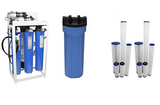Centrifugal Separators: Working Principle, Benefits, and Applications Discussed
Posted by David Cannon on 16th Oct 2019

Water is found in the most impure form at stagnant water bodies and wastewater processing plants. This is because the water gets mixed with oil and chemicals as result of industrial processing. Nowadays, every industrial plant invests in wastewater processing systems. The water is treated to remove grease, chemicals and other impurities before releasing it to local water bodies. In wastewater processing, various types of filters are used. The centrifugal separator are the most popular ones. Thes
What are the Important Parts of a Reverse Osmosis Equipment?
Posted by David Cannon on 14th Aug 2019

Reverse osmosis water filtration systems are widely used in industrial, commercial, and residential areas to filter drinking water. Reverse osmosis equipment is used to remove contaminants that are associated with taste and odor problems to include heavy metals, pesticides, viruses and bacteria. The major components of a reverse osmosis system are easy to maintain and have a low cost of operation.
Basic Parts of an RO System Discussed in Detail
Understanding the function of e
Pulp and Paper Industries Waste Water Treatment
Posted by David Cannon on 26th Apr 2019

The pulp and paper is one such industries that utilizes a large quantity of water in every step of the manufacturing processes. The use of this excessive quantity of water automatically results in the release of large volumes of wastewater containing residual sludge waste, sediments, effluent solids, absorbable organic halides (AOX), chlorinated organic compounds, chemical oxygen demand (COD), and biological oxygen demand (BOD), among others. With the growing water scarcity and heighten
Ever wondered how much water volume is in your closed loop?
Posted by David Cannon on 16th Aug 2018
Often we get calls from our customers who are looking for corrosion inhibitor chemicals or glycol for their closed loop systems. The first question we ask is 'How much water does your system hold?' and the answer is always 'I don't really know'. To figure this out the plumber or mechanical contractor might try and estimate the volume by counting the length and diameter of the pipe installed but this does not take into account all of the fittings, valves, water heaters, boiler capacity etc.
